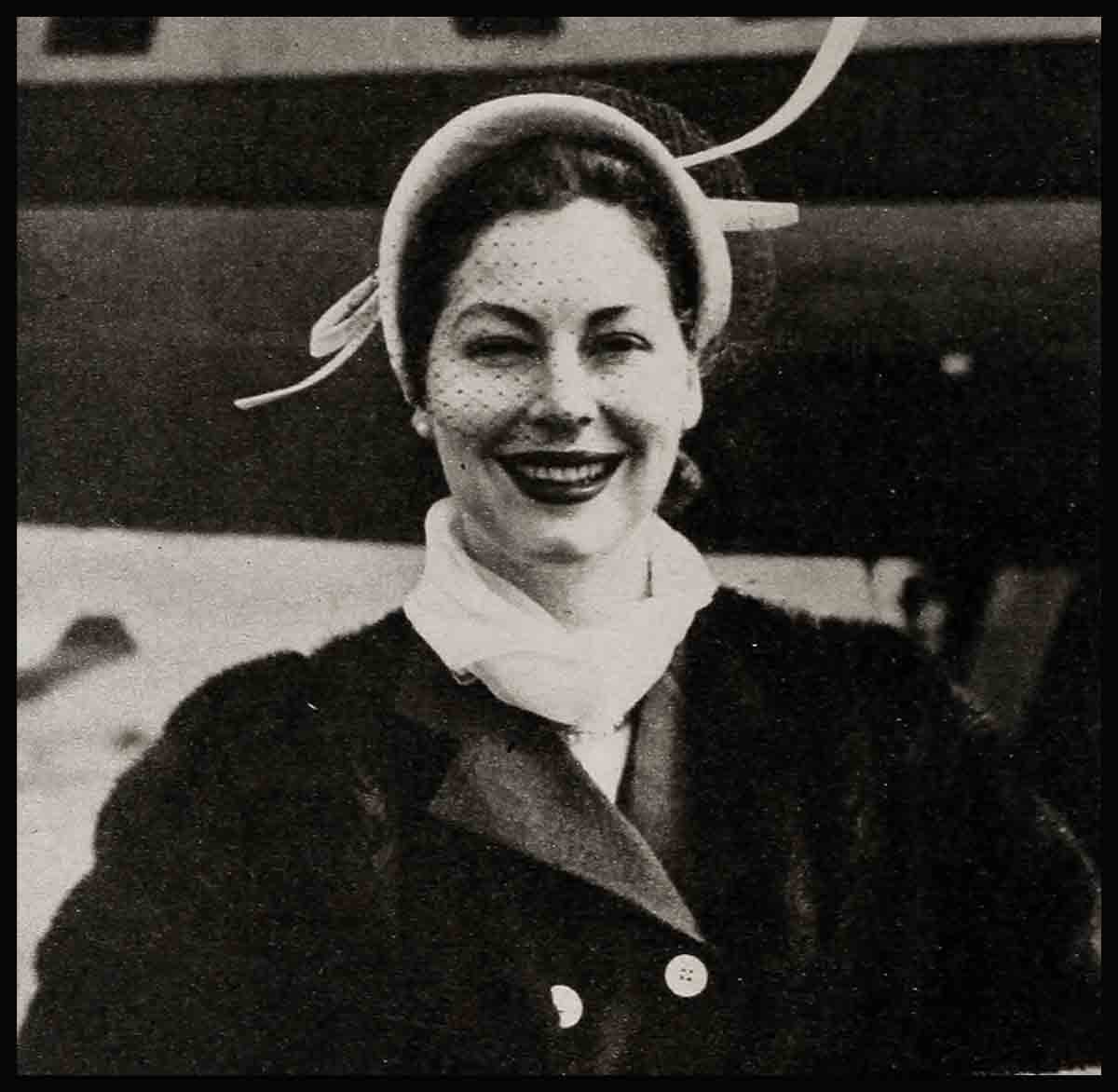
Getting To Know You—Ava Gardner & Frank Sinatra
A basically unhappy, fear-ridden beauty, Ava Lavinia Gardner is today happier than she has ever been before. And for three reasons.
She is living in Europe. She is convinced that she and Frank Sinatra can make a go of their marriage, and she is content with her work.
This marks the first time in a decade that Ava has been satisfied with her geographical location, the condition of her love-life, the state of her finances, and the progress of her career.
In short, the belle of Grabtown, North Carolina, now has pretty nearly everything she’s clamored for, everything, that is, except children, and with a little luck, they may be forthcoming in the future, especially since Frankie has been touring the Continent, flying to Ava’s side at every free moment.
Ava’s current peace of mind is very much in contrast to her state of misery when she left Hollywood last November. At that time, you’ll recall, it was touch and go as to whether Ava and her crooner would separate or stay together.
Frankie had caught his wife and Lana Turner in his Palm Springs house “cutting him up,” to use his own expression, and it looked very much as if this might be the swan song to their marriage. But fortunately, there was a reconciliation, the umpteenth reconciliation between the lovers, and Frankie eventually flew all the way to Nairobi in British East Africa, to be with Ava while she was preparing for work on Mogambo.
Ava says she liked working in Mogambo. “At least,” she explains, “I understood the part. It wasn’t the same old thing.”
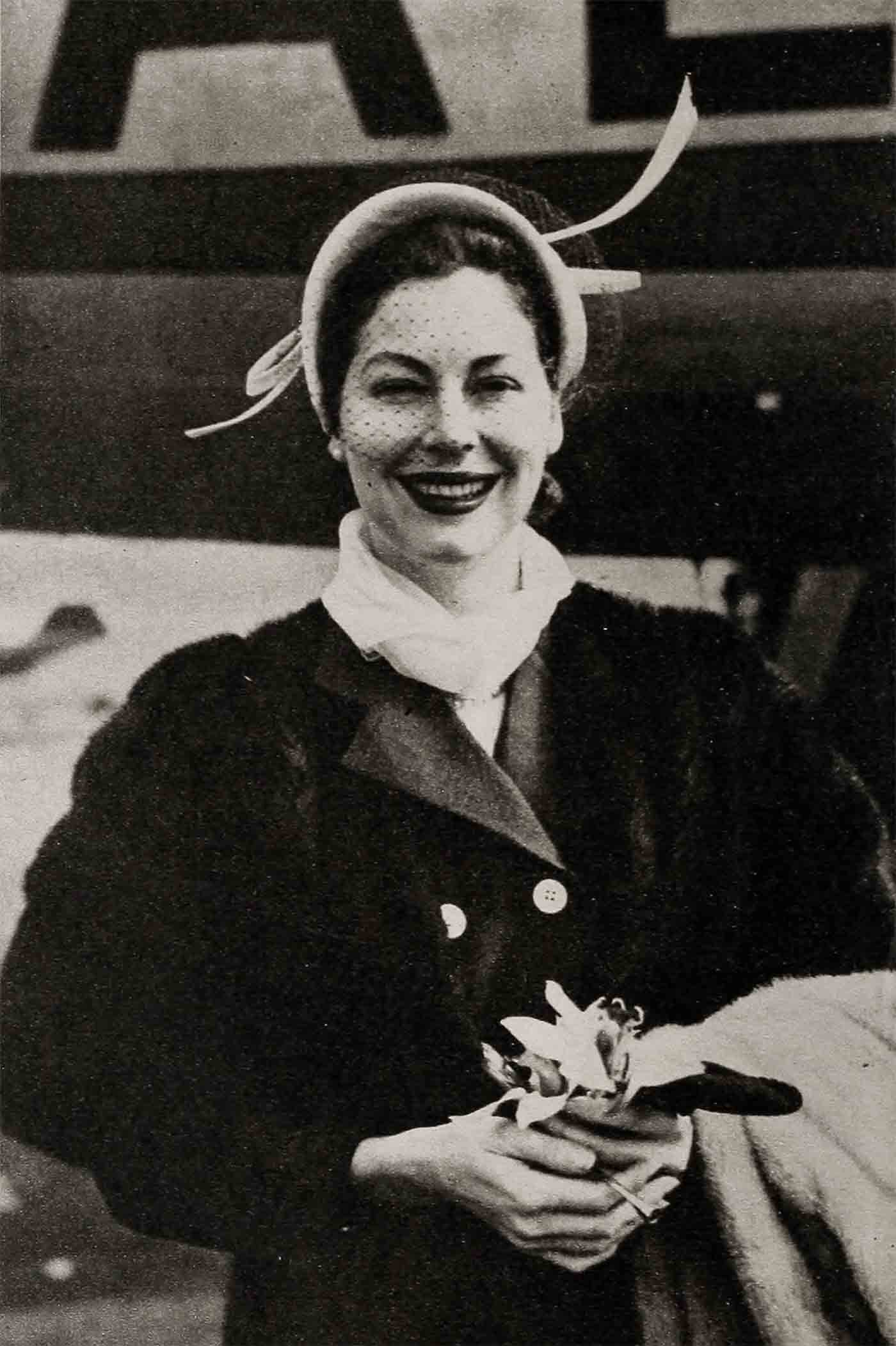
It was also good having Frankie around for moral support. When Frank flew back to the States, and Ava went out on location in Kenya, the setup wasn’t perfect but Ava made the best of it.
John Ford the crack director of Mogambo is a man who wears brass knuckles on his tongue. He gets good performances from stars by treating them as equals, no deference, the commands are curt and sharp. Occasionally, he waxes bitter and sarcastic.
In one particular scene in which Ava was working with Clark Gable, Ford didn’t like the actress’ performance and told her so in no uncertain terms.
In the old days when this happened to Ava, she would cower, retreat, and break into tears. This time she spoke up. “Look,” she said to Ford, “if you speak that way to me, you’ll get nothing out of me at all. I’ll clam up, and we’ll louse this picture good.”
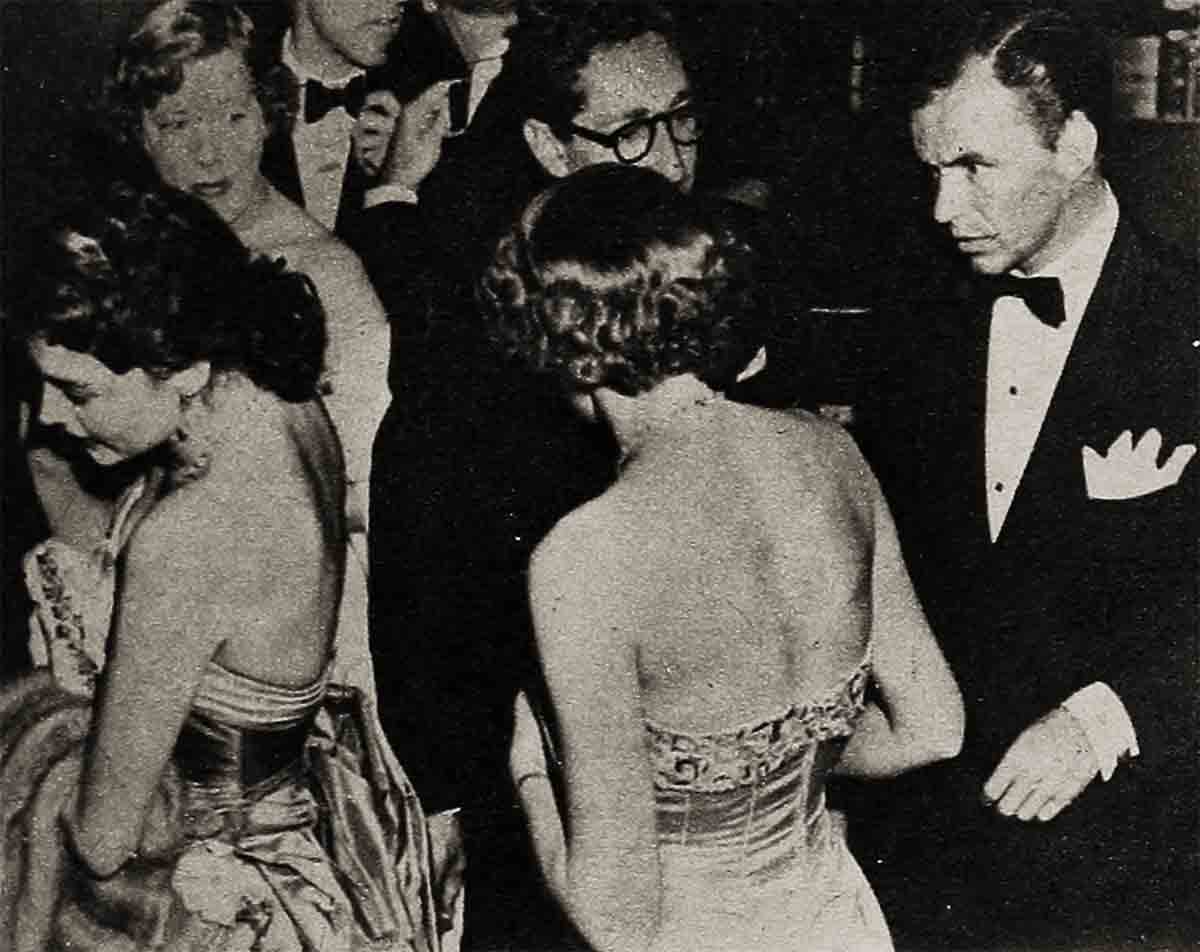
From that point on, Ford handled Ava gently, and she performed superbly. The director, however, had half a dozen baseball caps with long visors—the kind pilots wear—flown into Africa for the members of his selected team, Clark Gable, Grace Kelly, Bob Surtees, the camerman, Wingate Smith, his brother-in-law, and a few other choice friends. Significantly enough, Ava was not gifted with one of these caps. But she didn’t care.
Location work over, she flew back to London. Frank cancelled a television date in New York, thereby Sacrificing $5,000, and flew to her once again.
Sinatra has an ace talent agent in London, a fellow by the name of Jimmy Harding. Jimmy saw to it that Ava had every convenience. An apartment formerly occupied by John Lewis, a one-time member of the British Parliament, was subleased for Mrs. Sinatra.
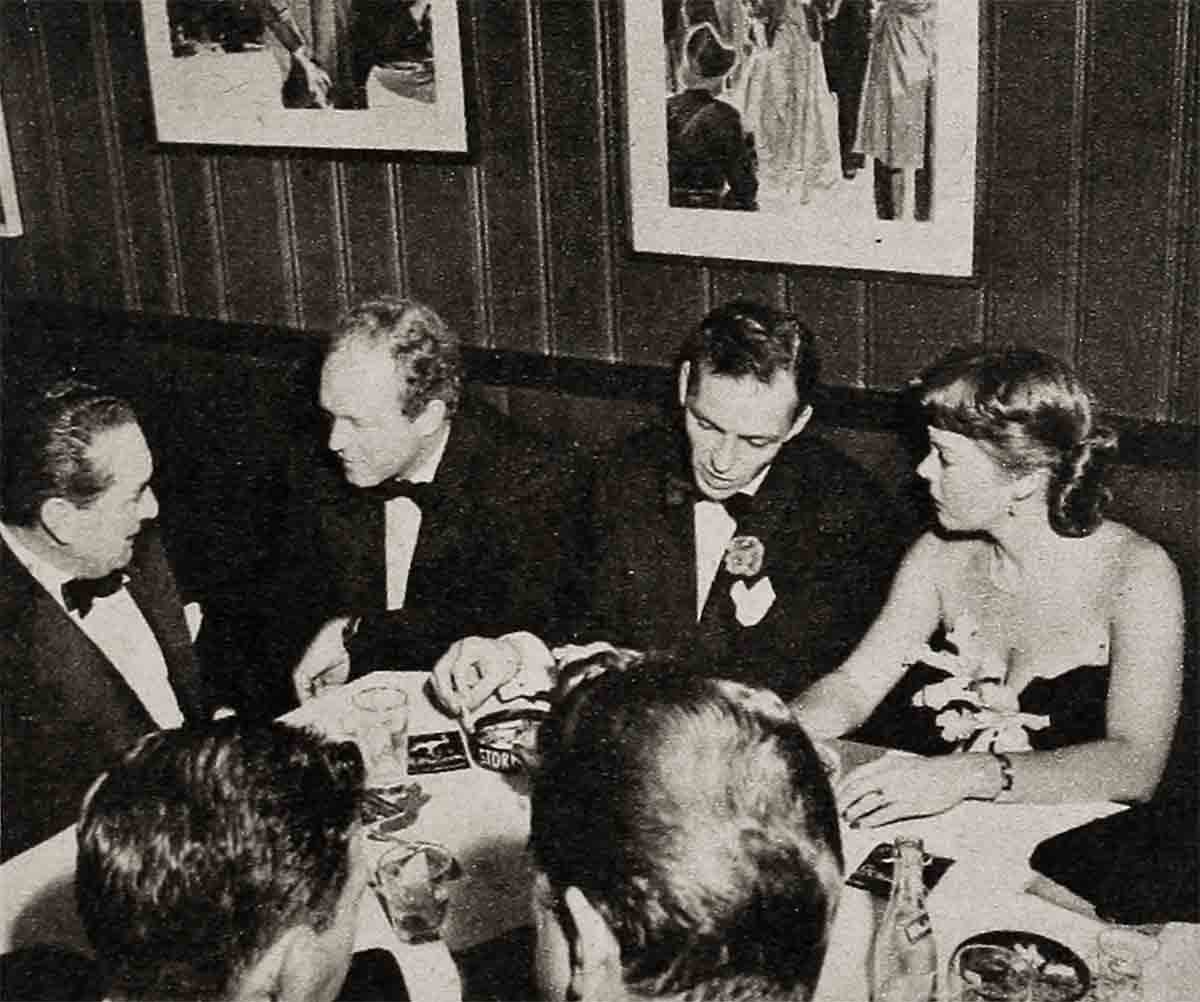
It’s a large apartment with three bedrooms. It’s well located in Regent Park. It’s tastefully decorated, and Ava makes it her European headquarters. This is where Frank joins her whenever he gets into London.
Jimmy Richards also hired for Ava a beautiful, blonde, tactful secretary named Eileen Thomas. Eileen acts as a buffer between Ava and the world of newspapermen who are always trying to get through to her.
Ava doesn’t particularly like to live alone because she gets lonely very quickly, and so when Frank is not with her, Eileen Thomas is. These two became such fast friends that when Mogambo was finished in London, Ava insisted upon taking Eileen with her to Madrid. Ava loves to vacation in Spain and not because of Mario Cabre, either. She has a dear friend, Noreen Grant, an Englishwoman, who lives there, and every chance she gets, Ava takes off for Madrid or Seville, phoning Frank long distance to try to meet her there.
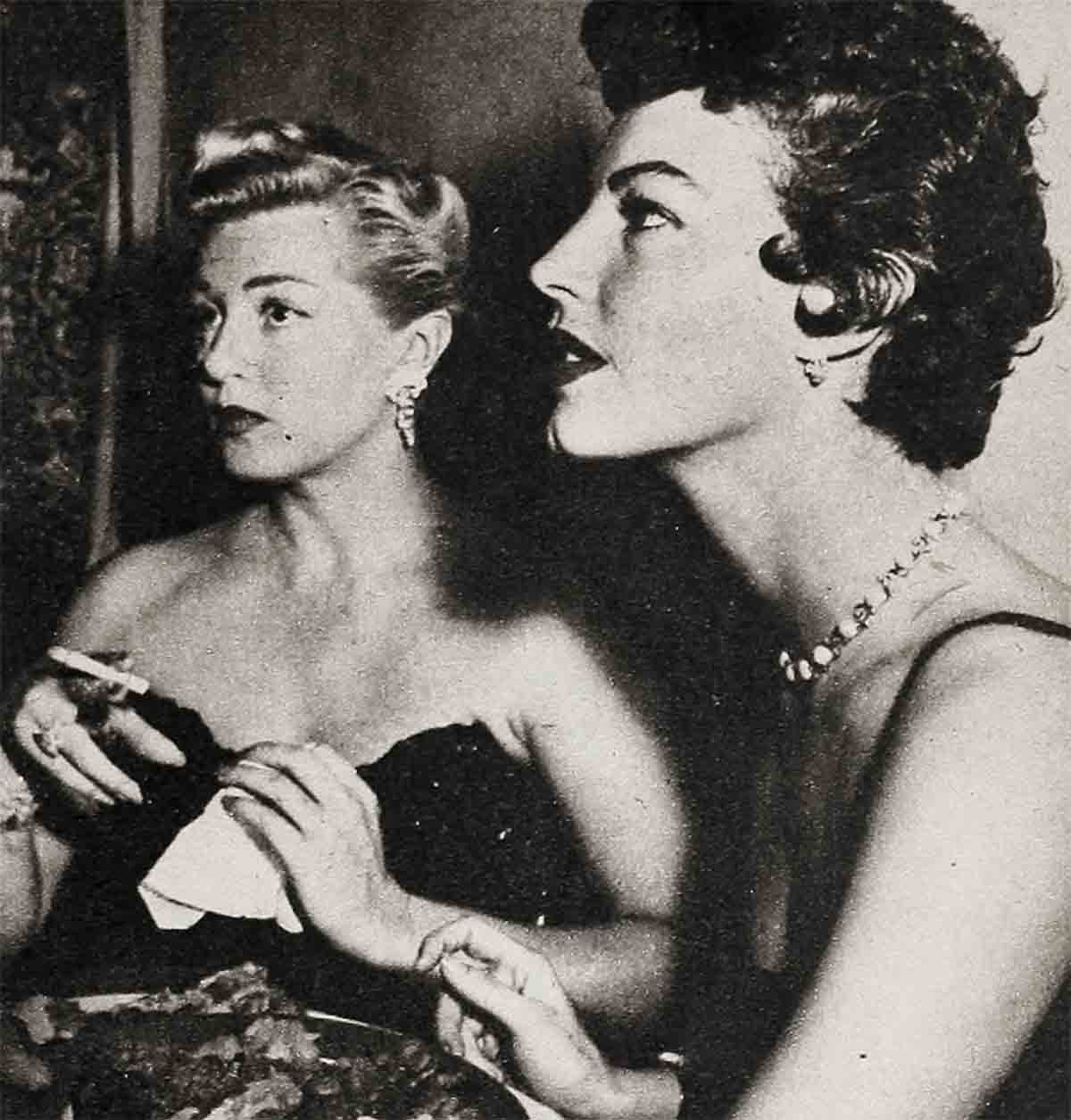
In Spain, Ava is never bothered by movie fans or reporters. Her private life is respected, and this is what she likes. She hates reporters who pry into the status of her love-life or who ask embarrassing questions about her old-time fights with Frankie.
When cornered, however, Ava gives reporters the impression that she is being frank, honest, and down-to-earth. “Look,” she recently told one in London, “I’ve never knocked myself out studying dramatics or Screaming about my career. I consider myself darn lucky being a movie star. If I get a good part I give it everything I’ve got. I think I know something about emotions, something about the way women feel under different sets of circumstances. That’s what I try to put on the screen.
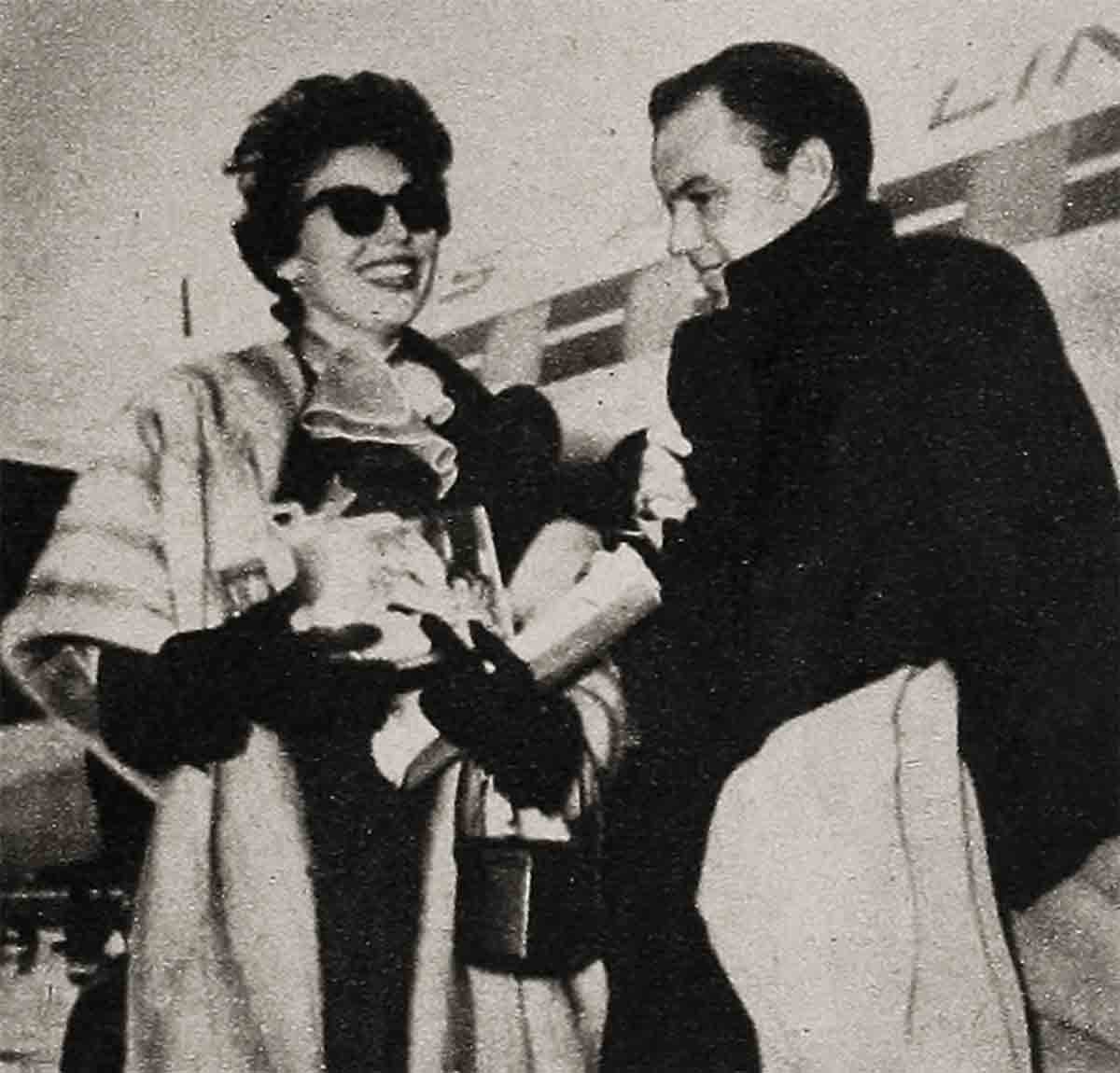
“When I get a nothing part, I just ride with it. There’s nothing else to do. You just hope that the next picture will be better . . . As for my marriage, it’s just fine. Frank tries to spend as much time with me as possible. I think we’ve developed a good scheme of things. He’s arranged to spend several months working in Europe. That’ll cut out all those transatlantic hops.”
It was Jimmy Harding, Frank’s agent, who set up the singer’s Continental tour. By the time this article appears in print, Frank should have sung all through Italy, France, Belgium, Holland, the Scandinavian countries, and Great Britain.
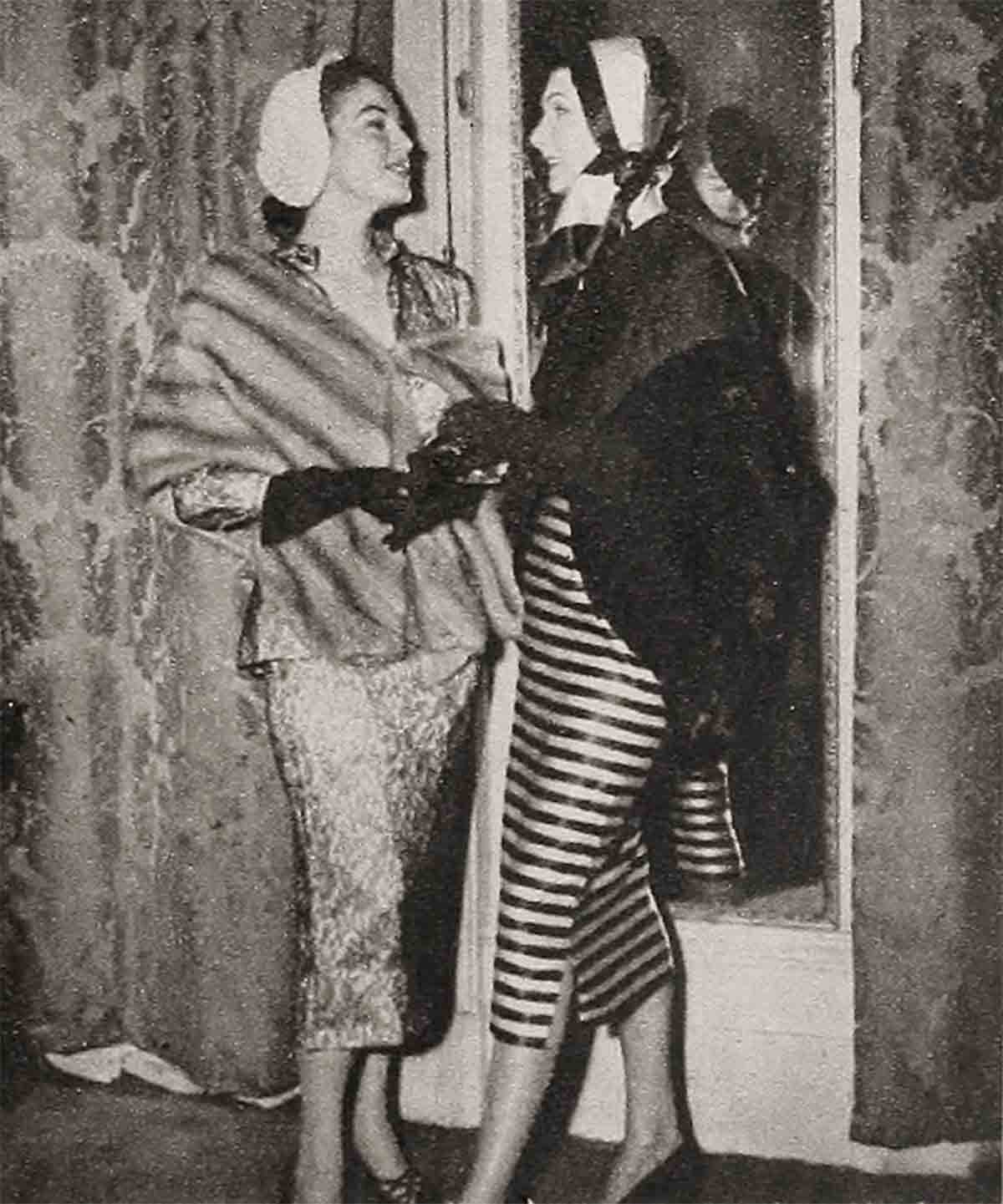
Frank is determined once and for all to allay Ava’s fears. And her greatest one is that he doesn’t really love her, which, of course, is nonsense—but Ava still has her doubts. She knows Frank like she knows the palm of her right hand. She knows what a charmer he is, how adaptive he can be, how really irresistible.
Many people don’t know it, but Sinatra has more confidence in himself than practically any other entertainer alive. He once said, “If I were going to be a painter, I know darn well I’d be a great one. Once I set my mind to doing something, I really can do it.”
There is hardly a girl in the world today that Frank can’t enrapture if he sets his mind on the target. Sinatra is a charm boy. He knows the score. He’s been around. He’s as sharp as a blade. He has known, it is safe to suppose, as many women as any crooner of his age. And this is what worried Ava sick from time to time.
A friend who once discussed Frankie with Ava reports that the second Mrs. Sinatra cocked her head to one side after the discussion and said, “I know it, all right. Frank has been around.”
When Ava married Sinatra she was not expecting a model celibate. She merely hoped that Frank had reached the stage in life where he was tired of sowing wild oats, where one woman was capable of giving him all the love and companionship he required.
Ava is now fairly well convinced that Frank has arrived at that point. Certainly, Frank has proven it to her. In Hollywood while preparing for Eternity, he dined occasionally with Marilyn Maxwell, a flame of yesteryear, but usually he was seen as one of a threesome. Many times he went to dinner with Judy Garland and Sid Luft.
Before he finished Eternity and winged to Europe to join his Ava, Frank was always afraid that someone might carry a ridiculous bit of gossip about him back to London. This would upset his brunette Carolina beauty, and when he arrived, there would be a battle royal.
It hasn’t come to pass. The European meetings between Ava and Frank have been warm, rapturous, even tempestuous. Frank stays away just long enough for Ava to miss him terribly and vice versa, so that when at last these two catch up with each other—well, the homecoming is memorable.
There has been talk in Spain to the effect that Frank may remain in Europe with Ava until her 18 months are up, early in 1954.
If Frank is able to satisfy the Internal Revenue people in Washington, and they okay his passport, this may very well come to be. In fact, Frank’s agent in London has been looking around for a country home that these lovebirds might rent. Not that Ava doesn’t like her Regent’s Park apartment. “It’s just that a house would be so much better, so much nicer.”
Other than for Sinatra’s estate in Palm Springs, Ava has no home she can call her own.
Most of the Hollywood stars who are working abroad are motivated in part by the advantageous tax laws. Ava would work abroad regardless of the tax laws, because she prefers living in Europe.
She feels that the movie colony atmosphere is not too conducive to a happy family life. She knows this from experience. She knows that movieland is beset with temptation. She knows what life was like in California with Mickey Rooney and Artie Shaw. But as a friend recently pointed out, “Ava has grown enough intellectually to realize that geography does not motivate the sex life so much as a man’s basic character. If a husband is going to play around, he’ll be just as faithless in New York or Glasgow as in Hollywood or Santa Monica.
“It is my own particular analysis,” this friend continues, “that the reason Ava doesn’t like Hollywood, that she prefers Europe is because Hollywood arouses a guilt complex in her.
“We might as well face facts, and the number-one fact is that there are many people in the motion industry who feel that the first Mrs, Sinatra, Nancy, got a raw deal. They’re wrong, of course, but they blame Ava for the divorce. They point out that if she hadn’t been around, Frank would’ve returned to his wife and three kids. They don’t realize that Sinatra might have pushed for a divorce in any case. They point out that Frank had left home before and that after his flings, he’d always returned. This time the temptation of Ava was too great, the pull of passion was too strong, and he succumbed. Ava Gardner, therefore in the eyes of a large segment of the population, particularly those of Sinatra’s religious faith, is regarded as a femme fatale.
“Ava is a perceptive girl. She knows all this. She knows that Nancy Sinatra has many friends in Hollywood. These people are also Frankie’s friends. When they visit Frank, I’m sure Ava wonders what sort of stories they will carry back to Nancy. Ava has always been unsure of herself, especially in Hollywood where so many people remember her as a silly, sexy, drawling girl from North Carolina who was used as a plaything by Mickey Rooney. Hollywood remembers Ava with Howard Duff, Artie Shaw and others. These aren’t pleasant memories.
“In Europe, Ava is treated as a famous international movie star. There is nobody in Europe who knew her when she was married to Mickey Rooney, when she acted fatuously and talked foolishly. Abroad, she is a woman of stature who conducts herself with decorum.”
In many ways, this analysis rings true. In London, by way of illustration, Ava never makes headlines nor does she cavort around the nightspots. When she is not working on her latest film, in this case, Knights Of The Round Table, she drives out to Richmond, a suburb, and spends the weekend with her friends Richard Attenborough and his actress wife Sheilah Sim who are currently starririg in an English play, The Mousetrap.
Anyway, overseas Ava is infinitely happier than she is in Hollywood. As for Frank, his major forte is adaptiveness, and he can get along anywhere. If the Nevada State Gambling Commission approves of his application for buying into the gambling casino of the Sands Hotel in Las Vegas, he may very well be assured of a large income for life, in which event he and Ava: would undoubtedly spend many years away from the rumors, gossip, innuendo and temptations of the movie colony.
In addition to children, all Ava Gardner has ever asked of life is peace of mind. Of late, she’s gotten some. After 30 years in this world, it’s just about time.
THE END
—BY MARSHA SAUNDERS
It is a quote. MODERN SCREEN MAGAZINE JULY 1953




